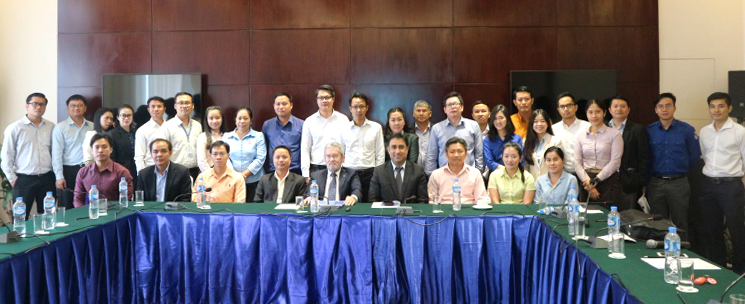Mekong Institute (MI) organized two national consultation workshops in Vientiane, Lao PDR and Bangkok, Thailand on August 14 and 16, respectively, as part of the study on Regional Cooperation Mechanism on Priority Areas under the Mekong-Lancang Cooperation (MLC) Framework. The national consultation workshops aimed at having an in-depth understanding on coordination processes (i) of MLC programs at national and regional levels and (ii) between MLC programs and other regional and sub-regional cooperation programs. The workshop also served as a platform for exchange of experiences, practices, and suggestions among officials and coordinators who are involved in projects under the MLC’s five priority sectors including water resource management, agriculture and poverty reduction, production capacity, cross-border trade, and connectivity.
The national consultation workshop in Vientiane gathered 30 officials and representatives from key ministries, implementing agencies, and concerned institutions to discuss ideas and recommendations on further strengthening coordination and collaboration in line with MLC’s objectives. Co-organized by the Ministry of Foreign Affairs of Lao PDR, Mr. Ammala Saenchonghack, Director of the Ministry’s Economic Division, served as one of the facilitators during the workshop. Meanwhile, the Bangkok leg of the workshop was co-organized by the Ministry of Foreign Affairs of Thailand, and likewise, the Ministry’s Counselor Mr. Kasem Sailuenam extended support as workshop moderator. Around 15 officials and representatives from key ministries related to MLC’s priority areas joined the workshop, which shared the same objectives of exchanging views, best practices, and recommended strategies on enhancing inter-agency and intra-regional cooperation under the MLC framework. Both national consultation workshops were attended and co-hosted by Mr. Madhurjya Kumar Dutta, Director of MI’s Trade and Investment Facilitation Department, and Dr. Jean-Pierre A. Verbiest, Honorary Advisor to MI.
In his opening remarks, MI Executive Director Dr. Watcharas Leelawath highlighted the importance of cooperation mechanisms: “Our shared goal of regional development and integration is anchored on synergistic cooperation among Mekong-Lancang countries. It is through dialogue and collective thinking, such as these consultation workshops, that sets the harmonization of efforts to ensure that it leads toward complementarity, and not duplicity.” He also expressed keenness in hearing the point of views, experiences, and suggestions of different stakeholders from which MI shall thoroughly consider in identifying ways forward for MLC-supported projects and activities.
A series of national consultation workshops will also be organized in September in Cambodia, P.R. China, Myanmar, and Vietnam, in collaboration with the respective country’s Ministry of Foreign Affairs. Results from the national consultations as well as strategy recommendations from MI’s team of research experts will be collated and reported to strengthen cooperation among ministries and line agencies, project implementing agencies, and concerned stakeholders in the ML countries.
The abovementioned study is part of an ongoing project on Capacity Building for National Coordinator of Mekong-Lancang Cooperation implemented by MI, in collaboration with the Ministry of Foreign Affairs of Thailand, with the support of the People’s Republic of China through the Mekong-Lancang Cooperation Special Fund. To learn more about the project, please visit http://bit.ly/2Z6dHok








